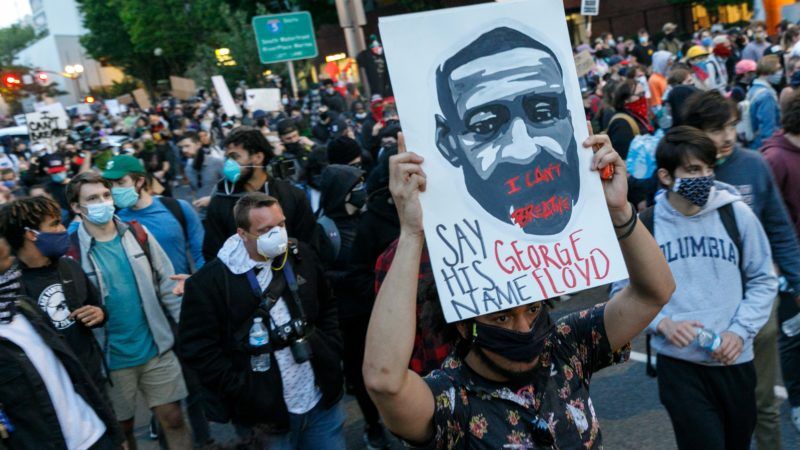Portland Disbands School Police Program
Several other major cities across the country are considering similar moves as calls for national policing reform intensify.

School resource officers (SROs) will no longer patrol the halls of K–12 public schools in Portland, Oregon—the latest major city to announce, in the wake of the police killing of George Floyd, that it's pulling police out of schools.
Portland Mayor Tom Wheeler announced Thursday that the Portland Police Bureau would be disbanding its Youth Services Division and reassigning all its officers. "Leaders must listen and respond to [the] community," Wheeler tweeted.
Earlier this week, the Minneapolis school board voted unanimously to terminate its contract with the Minneapolis Police Department. HuffPost reports that other major cities are considering similar measures. The moves come amid nationwide protests and calls for police reforms following the death of George Floyd, who was killed by a Minneapolis officer who pressed his knee on Floyd's neck for nearly nine minutes. Several colleges have also cut ties with police departments.
Wheeler said $1 million will be taken from the police budget and used for a "community driven process." That money will fund counselors, social workers, and "culturally specific partnerships," Portland Public Schools Superintendent Guadalupe Guerrero said.
The number of police in U.S. schools has increased dramatically over the past 50 years, often following school shootings. Groups like the American Civil Liberties Union have made the case that putting more police in schools exacerbates the "school-to-prison pipeline," and that enforcement of petty disturbances disproportionately affects minorities.
"If black communities don't trust police on the streets, they shouldn't trust them in school hallways," Judith Browne Dianis, executive director of Advancement Project, which runs a national campaign to end school policing, told Ed Week. "We need to be thinking about alternatives to school safety so that children can feel safe and can learn in an environment that is safe for them to thrive. Police undercut that culture."
Scrutiny of SROs increased last September, when an Orlando school resource officer made national headlines for arresting a 6-year-old girl.
As it has for law enforcement at large, the proliferation of cell phone videos, policy body cameras, and social media has led to numerous viral incidents involving SROs. In February, a school resource officer at a high school in Camden, Arkansas, was relieved of duty after video showed him putting a student in a chokehold and lifting the student off of the ground. Last December, a North Carolina SRO was fired after he brutally body-slammed a middle-schooler. In November, a Broward County Sheriff's deputy in Florida was arrested and charged with child abuse after video showed him body-slamming a 15-year-old girl at a special needs school.
The National Association of School Resource Officers (NASRO) claims that carefully selected, well-trained SROs can actually decrease arrests by building good relationships within the school.
"There's a right and wrong way to do law enforcement in schools," says NASRO executive Mo Canady. "When it's done wrong, I can understand why someone might want to see it go away, but there are way too many opportunities to do it right and really make a difference in communities."
Some states, like Pennsylvania, require potential SROs to go through NASRO training, while others, like Florida, leave training requirements up to individual police departments.
Canady noted that the Minneapolis Police Department had never sent its officers to NASRO for training. But NASRO has trained Portland school resource officers, and Canady says the city's decision caught him off guard.
"They're actually a model agency in how they do SRO work," Canady says. "This is the first I've heard that there are concerns or potential problems there, so that comes as a shock."
Activists are calling for SROs to be discontinued in other cities, such as Chicago, Seattle, and Denver.
